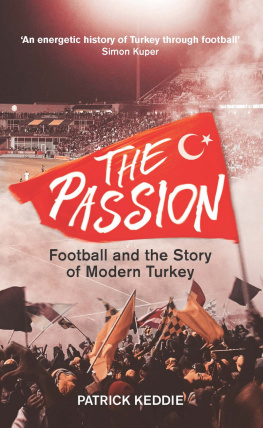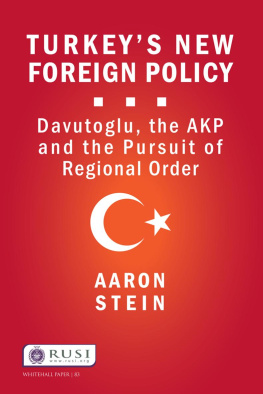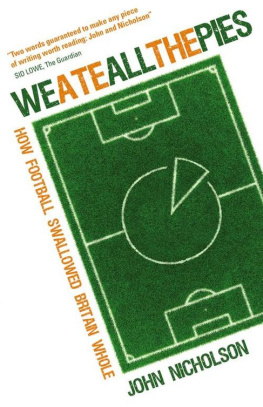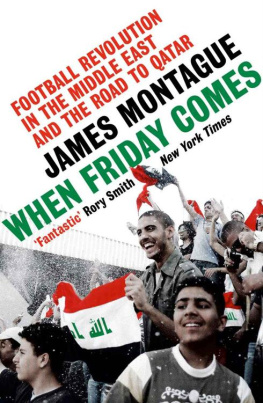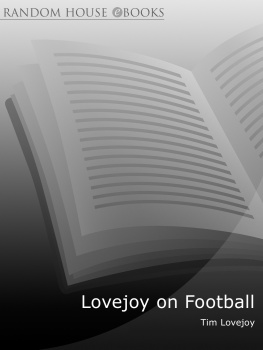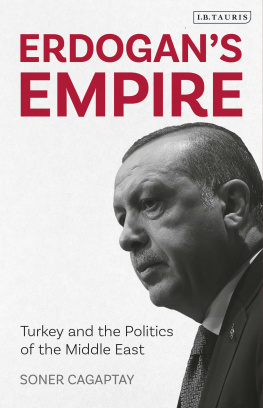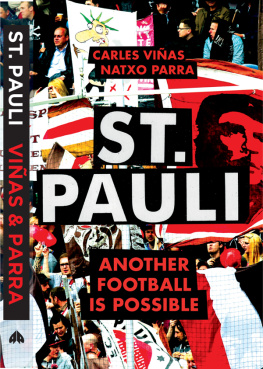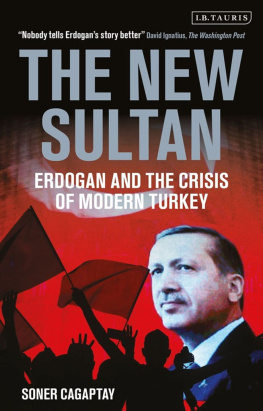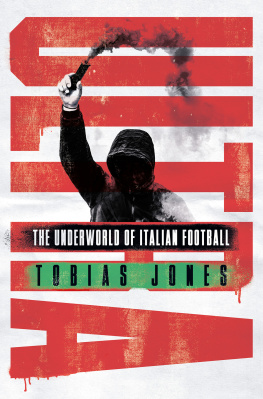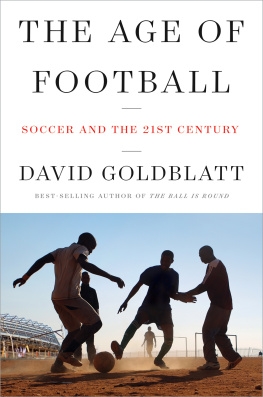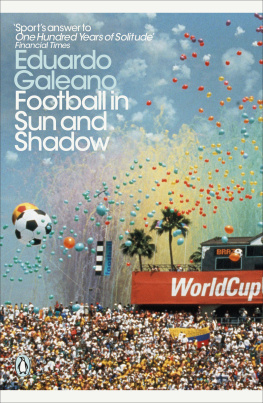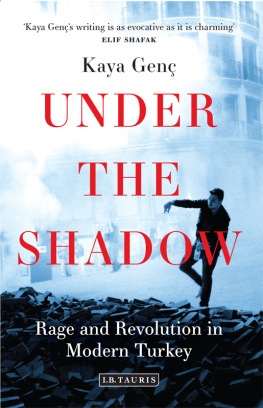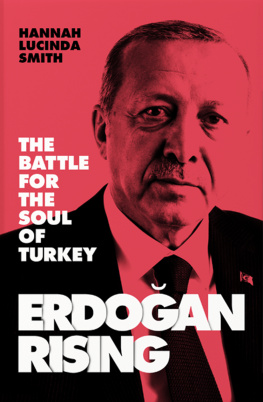PATRICK KEDDIE is a journalist and essayist based in Istanbul. His writing has appeared in Al Jazeera , Delayed Gratification , the Guardian , the Huffington Post , the LA Review of Books , Middle East Eye , and the Sunday Herald , among others.
I found The Passion a captivating account of modern Turkey, its passions and frustrations; perhaps it wont make you fall in love with Turkish football, but it will help you see why it is so central in understanding Turkeys soul.
Kaya Genc
author of Under the Shadow: Rage and Revolution in Modern Turkey
Patrick Keddie takes us inside the unceasing Turkish football conversation. The game turns out to be a great device to explain this little understood, football - mad country and its football - mad ruler (who recently banned the foreign word arena, forcing many Turkish stadiums to be renamed). The Passion is an energetically researched history of Turkey through football.
Simon Kuper
author of Football Against the Enemy
Published in 2018 by
I.B.Tauris & Co. Ltd
London New York
www.ibtauris.com
Copyright 2018 Patrick Keddie
The right of Patrick Keddie to be identified as the author of this work has been asserted by the author in accordance with the Copyright, Designs and Patents Act 1988.
All rights reserved. Except for brief quotations in a review, this book, or any part thereof, may not be reproduced, stored in or introduced into a retrieval system, or transmitted, in any form or by any means, electronic, mechanical, photocopying, recording or otherwise, without the prior written permission of the publisher.
References to websites were correct at the time of writing.
ISBN: 978 1 78453 802 6
eISBN: 978 1 78672 333 8
ePDF: 978 1 78673 333 7
A full CIP record for this book is available from the British Library
A full CIP record is available from the Library of Congress
Library of Congress Catalog Card Number: available
Text design, typesetting and eBook by Tetragon, London
To my parents
Contents
- List of Abbreviations
- Introduction
- Prologue: Ultra
- Fathers and Sons
- The Battle for Ankara
- We are watching a puppet show
- Stadium Sagas
- Everywhere is Taksim, everywhere is resistance
- Kurdish Cup Specialists
- The Rebel Referee
- Free Syrian Football
- Dreaming at the Edge of Europe
- I fell in love with football
- Epilogue: Football is faster than words
- Acknowledgements
- Notes
List of Abbreviations
AKP (Justice and Development Party) a conservative party with its roots in Islamism, co - founded by Recep Tayyip Erdogan in 2001
ANAP (Motherland Party) a centre - right , neoliberal political party founded by Turgut Ozal
CAS (Court of Arbitration for Sport) an international body established to settle sports - related disputes
CHP (Republican Peoples Party) a Kemalist and social - democratic political party
CUP (Committee of Union and Progress) an umbrella party for the Young Turks during the Ottoman Empire
DP (Democrat Party) a centre - right party led by Adnan Menderes
FETO (Fethullahist Terror Organisation) the Turkish governments name for an alleged Gulenist terrorist group
FIFA (Fdration Internationale de Football Association) world footballs governing body
FSA (Free Syrian Army) a Syrian opposition group
FSE (Football Supporters Europe) a European fan network
HDP (Peoples Democratic Party) a left - wing and pro - Kurdish political party
ISIS (Islamic State of Iraq and the Levant) a jihadist terrorist organisation
MHP (Nationalist Movement Party) a far - right , ultranationalist political party
MUSIAD (Independent Industrialists and Businessmen Association) a non - governmental organisation of largely conservative small and medium businesses
OHAL (Governorship of Region in State of Emergency) a state of emergency region in southeast Turkey from 1987 to 2002, during the height of the Turkish states war with the PKK
PKK (Kurdistan Workers Party) a Kurdish militant group
TAK (Kurdistan Freedom Hawks) a Kurdish militant group, likely linked to the PKK
TOKI (Public Housing Development Administration) a Turkish government - backed housing agency
TUSIAD (Turkish Industry and Business Association) a non - governmental organisation of mostly Kemalist businesses
UEFA (Union of European Football Associations) European footballs administrative body
YDG - H (Patriotic Revolutionary Youth Movement) the urban youth wing of the PKK
Introduction
In Turkeys political turmoil of the late 1970s, having the wrong kind of facial hair could get you killed.
Left - wing and right - wing groups were murdering each other in street clashes that approached civil war. The Grey Wolves a militia of the ultranationalist MHP wore horseshoe moustaches; for some it represented M for milliyetci (nationalist), or was crescent shaped, like the Islamic symbol on Turkeys flag. Leftists typically favoured thick walrus moustaches that covered the upper lip. Beards tended to be associated with Islamists, scourge of the so - called secular Kemalists.
The violence ended with the 1980 military coup, and Recep Tayyip Erdogans football career came to an abrupt, supposedly bearded, halt shortly after.
In 1981 Turkeys 27- year - old future leader was captain of the semi - professional team of Istanbuls tram and funicular company. His nickname was apparently Imam Beckenbauer, a reference both to his piety and to his supposed skills; like the German libero Franz Beckenbauer, Erdogan was tall and rangy hagiographers have painted him as a similarly elegant, talented and dominant leader on the pitch. The myth goes that Erdogan was twice made offers to sign for Fenerbahce, the club he has supported since childhood. His detractors tend to portray him more in the vein of a Vinnie Jones - type figure, a blunt and unrefined hardman.
Erdogan has said that a military figure took over the football club in the repressive aftermath of the coup, and ordered all the bearded players to shave. Erdogan claims to have been wearing a beard, and that, while others complied, he refused to shave resigning from the team in protest in June 1981. This sounds like typical self - mythologising : most photos at the time show him wearing a moustache.
Like many religiously conservative Turks, Erdogan now sports a badem: a short, clipped almond moustache. As a politician, Erdogan has long portrayed himself as an underdog and taps into a sense of grievance among the broad swathes of pious, conservative Turks, many of whom were marginalised and repressed by the Kemalist elites who previously dominated the state. But although some Islamists were jailed and persecuted in the brutal post - coup period, they were not the primary victims of the repression. Erdogan was associated with Islamist movements as they were generally growing in strength and were increasingly often supported by the state.
Erdogan has now been the dominant force in Turkish politics for more than a decade and a half: first as mayor of Istanbul, then as Turkeys prime minister, finally as president. He is surely the most powerful and charismatic Turkish leader since the countrys founder and first president, Mustafa Kemal Ataturk.

